Food is Medicine for Improving Cancer Outcomes

Please join the Department of Nutrition for the Monday Nutrition Seminar featuring Fang Fang Zhang, MD, PhD, Professor and Chair of the Division of Nutrition Epidemiology and Data Science at the Friedman School of Nutrition Science and Policy, Tufts University. Dr. Zhang’s talk—”Food is Medicine for Improving Cancer Outcomes”—will take place on May 11 at 1:00 p.m. ET in FXB G-13 and via Zoom (registration is required).
Healthy snacks will be provided, thanks to the generous support of the Wellbeing Project Fund from the Office of the Associate Provost for Student Affairs.
The Monday Nutrition Seminar Series is free and open to the public. If you plan to attend this event and do not have an active HUID, please fill out the registration form by 3:00 p.m. ET on the Friday before the seminar to request a visitor pass to access the building.
Seminar speakers share their perspectives, they do not speak for Harvard.
Speaker Information
Organizers
Harvard Pop Center Social Demography Seminar: “Strategic adaptation and Asian Americans’ socioeconomic evolution, 1940 to 2018–22”
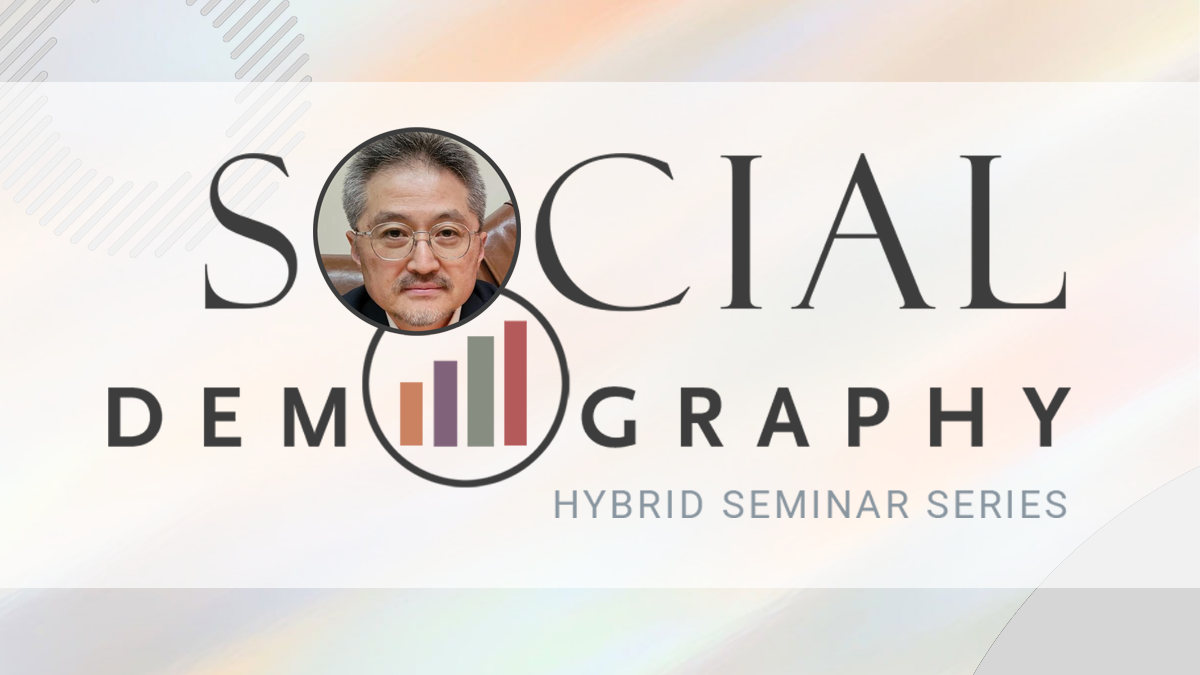
ChangHwan Kim, PhD, professor of sociology, and director of graduate studies, University of Kansas, presents (REMOTELY) “Strategic adaptation and Asian Americans’ socioeconomic evolution, 1940 to 2018–22.”
Lunch will NOT be served since the speaker is presenting remotely.
Speaker Information
Organizers
Monday Nutrition Seminar | Nutrition Reimagined: Science, Obesity, and Dietary Guidelines at a Crossroads

Please join the Department of Nutrition for the Monday Nutrition Seminar featuring Frank B. Hu, MD, MPH, PhD, the Fredrick J. Stare Professor of Nutrition and Epidemiology and Chair of the Department of Nutrition at HSPH. Dr. Hu’s talk—”Nutrition Reimagined: Science, Obesity, and Dietary Guidelines at a Crossroads”—will take place on March 9 at 1:00 p.m. ET in FXB G-13 and via Zoom (registration is required).
Healthy snacks will be provided, thanks to the generous support of the Wellbeing Project Fund from the Office of the Associate Provost for Student Affairs.
The Monday Nutrition Seminar Series is free and open to the public. If you plan to attend this event and do not have an active HUID, please fill out the registration form by 3:00 p.m. ET on the Friday before the seminar to request a visitor pass to access the building.
Seminar speakers share their perspectives, they do not speak for Harvard.
Speaker Information
Organizers
Wait Time Is Over for Eisner’s “Waiting-Room Willie”
More than 50 years ago, Will Eisner’s American Visuals Studio produced “The Sad Case of Waiting-Room Willie” for the Committee on Public Medical Health Education of the Baltimore Medical Society. This fascinating case of public health advocacy has long gone unexamined, particularly in the modern context of American healthcare.
The MCPHS University Center for Health Humanities and the Harvard Medical School’s Countway Library are bringing a team of local experts to honor Eisner’s legacy while also addressing some of our contemporary Graphic Medicine questions that plague Willie.
Panelists:
Martha Gardner – Associate Professor of History and Social Sciences, MCPHS University
A. David Lewis – Associate Professor of English and Health Humanities, MCPHS University
Dan Mazur – Artist, Publisher; “Will Eisner: A Comics Biography”
Tavon Mei – Graphic Medicine Club representative, Boston University
Matthew Noe – Lead Collection and Knowledge Management Librarian, Countway Library (Moderator)
Organizers
Occupational and Environmental Medicine Grand Rounds
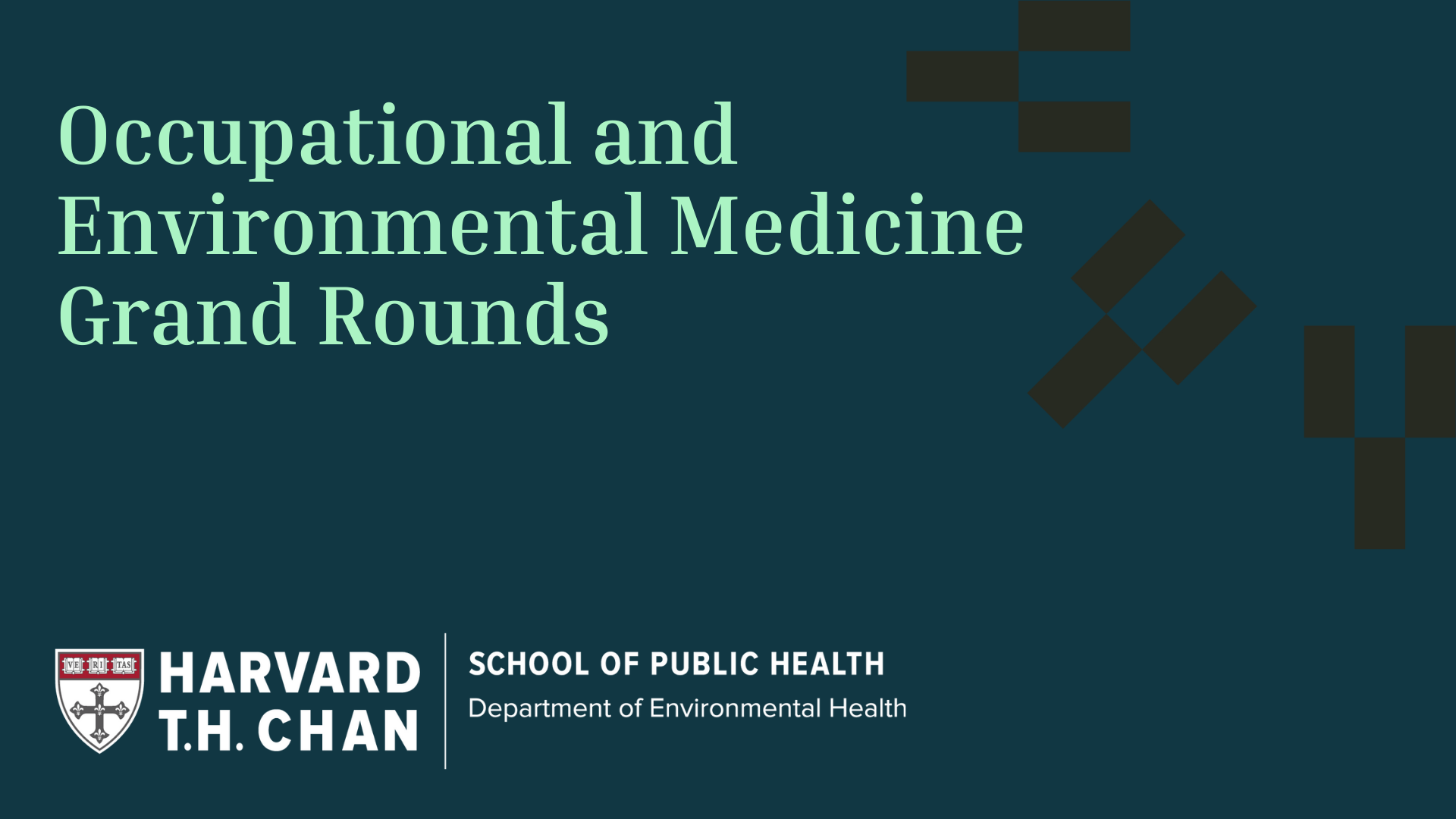
The Department of Environmental Health and the Occupational and Environmental Medicine Residency Program invite you to the next Occupational and Environmental Medicine Grand Rounds:
Topic 1: Association Between Diffusing Capacity and Symptoms and Small Airway Abnormalities in Deployed US Military Veterans
- Presenter: Erika Anderson, MD, MPH, Chief Resident, Occupational and Environmental Medicine, Harvard T.H. Chan School of Public Health
Topic 2: Leveraging Digital Health Resources for Pregnancy Care: A Model for Provider Recommendation
- Presenter: Shannel Pegram, DO, MPH, PGY 5, Occupational and Environmental Medicine, Harvard T.H. Chan School of Public HealthLocation: Building 1, Room 1302 and Zoom
Location: Building 1, Room 1302 and Zoom
RSVP: Please click here to register.
CMEs for US licensed physicians
This activity has been planned and implemented in accordance with the accreditation requirements and policies of the Accreditation Council for Continuing Medical Education (ACCME) through the joint providership of The Harvard T.H. Chan School of Public Health and the Harvard Chan Education and Research Center. The Harvard T.H. Chan School of Public Health is accredited by the ACCME to provide continuing medical education for physicians. The Harvard T.H. Chan School of Public Health designates this live activity for 1.5 AMA PRA Category 1 Credits™. Physicians should claim only the credit commensurate with the extent of their participation in the activity.
Speaker Information
Organizers
Community-Engaged Research Working Group in Environmental Health
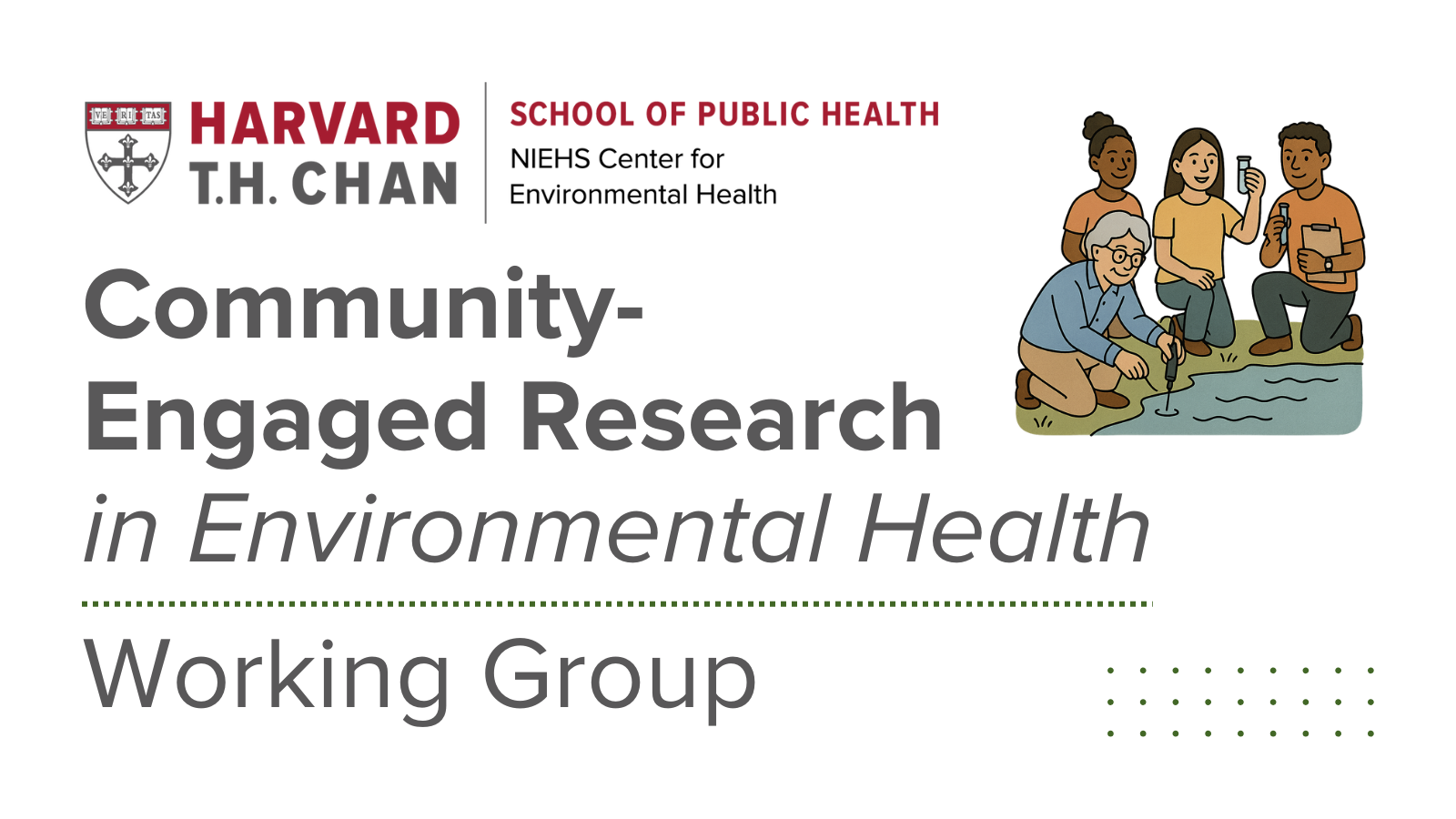
Join the Harvard Chan NIEHS Center’s working group on community-engaged research in environmental health!
This working group brings together faculty, trainees, students, and staff to discuss the methods and practice of conducting community-engaged research with a focus on environmental health.
We’ll meet in person in Building 1, 1302 on April 6, 1-2:00 pm.
April agenda: We will share successes and challenges in our own ongoing community-engaged research, and discuss how we can collaborate in this research field.
Please email niehsctr@hsph.harvard.edu to RSVP!
Speaker Information
Organizers
Research Addressing Cancer Disparities in New York City

Join us on Wednesday, April 8th for the Department of Epidemiology featuring Dr. Rulla Tamimi discussing Research Addressing Cancer Disparities in New York City.
Abstract: Dr. Tamimi will describe the catchment area of the Sandra and Edward Meyer Cancer Center in New York City. New York City (NYC) is a region of extremes with some of the richest and poorest living in close proximity. These extremes have a profound impact on health, with major disparities in life expectancy, with cancer driving these differences as the number 1 and 2 causes of premature mortality and overall mortality, respectively. NYC is one of the most heterogeneous cities in the U.S. She will share her work as the Associate Director of Population Science at the Sandra and Edward Meyer Cancer Center, where she builds research programs that address the needs of the catchment area. She will also share research from the Center of Social Capital (SoCa) Promoting Multigenerational Health, a center she co-leads in response to the National Cancer Institute’s Persistent Poverty Initiative. The mission of the Center is to improve cancer risk and outcomes in persistent poverty census tracts throughout NYC by promoting multi-generational health. She will highlight recent work from the center.
Bio: Dr. Rulla Tamimi is the Chief of the Division of Epidemiology in the Department of Population Health Sciences and Associate Director of Population Science at the Sandra and Edward Meyer Cancer Center. She is a cancer epidemiologist whose research has advanced our understanding of breast cancer risk and prognosis. Dr. Tamimi has led numerous NIH-funded studies and authored over 400 peer-reviewed publications, identifying key genetic, molecular, and lifestyle predictors of breast cancer. Her work includes studies of early-life and environmental exposures, molecular tumor characterization, and mammographic features as predictors of disease. Throughout her career, she has played a key role in developing collaborative research efforts, with a long-term commitment to improving cancer prevention and health equity.
Speaker Information
Organizers
Related Events
Center Member Research Presentation: Heike Gibson, PhD
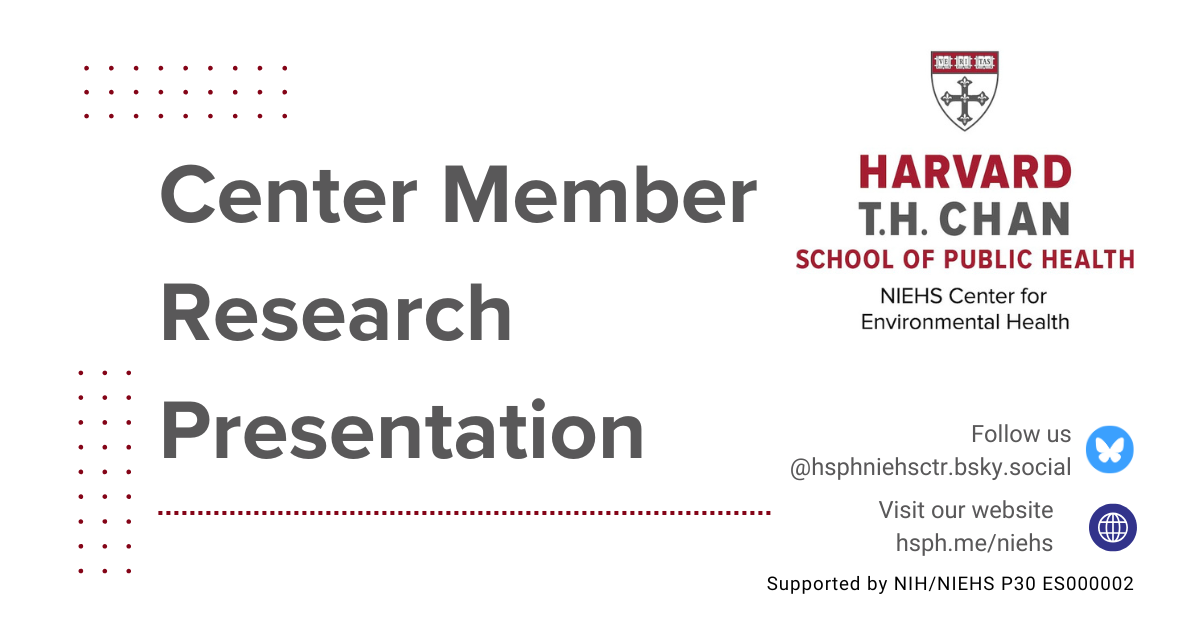
Join us for a Center Member Research Presentation by Dr. Heike Gibson. Following a brief presentation, there will be time for all participants to engage in a cross-disciplinary discussion with Dr. Lee and each other.
About the speaker: Heike Gibson, PhD, is a Senior Research Scientist at the Harvard T.H. Chan School of Public Health.
This event will be held in person in HSPH Bldg. 1, 1302 and via Zoom. Register here
Speaker Information
Organizers
Pathways to Impact through Environmental Sustainability
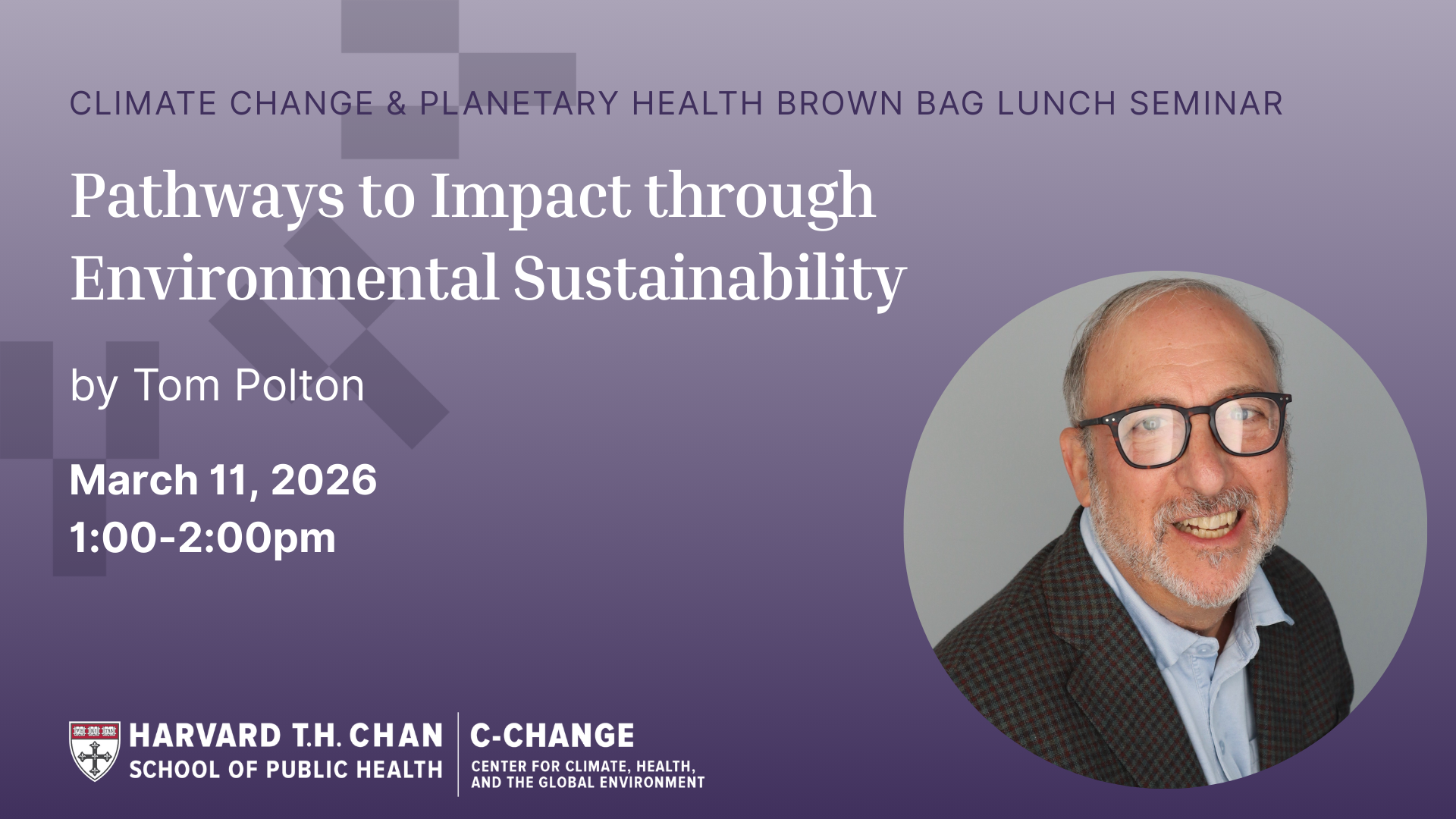
The Climate Change & Planetary Health Concentration invites you to their next Brown Bag Lunch Seminar:
Title: Pathways to Impact through Environmental Sustainability
Speaker: Tom Polton
Location: FXB G-12
Everyone is welcome, whether or not you are a part of the concentration. This seminar is in-person only.
About the Speaker:
Tom joined Pfizer immediately after finishing his master’s degree from the Department of Environmental Health Sciences at the Harvard TH Chan School of Public Health in 1983. He began his tenure at Pfizer by leading their global occupational hygiene and process safety programs. From 2009 on, he oversaw the environmental sustainability and product stewardship programs. Since leaving Pfizer, Tom has been involved with the Climate Reality Project, former Vice President Al Gore’s grassroots climate organization serving on the NY State Leadership Team. He also has been active with the 3000+ member Harvard Alumni for Climate and Environment (HACE) co-chairing a Climate and Health series for the alumni members. At the 2024 HSPH Alumni weekend he moderated a panel on Extreme Heat with Professors Gaurab Basu and Barrak Alahmad. Tom is a member of the Harvard Salata Institute’s Alumni Working Group, and an adjunct professor teaching “Enterprise Sustainability” to Clarkson University graduate students pursuing a MS in Engineering Management and has been lecturing at Harvard Chan for the past 20 years. And lastly, he advises organizations on sustainability strategy at NV Sustainability LLC, a consulting firm he founded with the motto “become green with NV.”
Speaker Information
Tom Polton
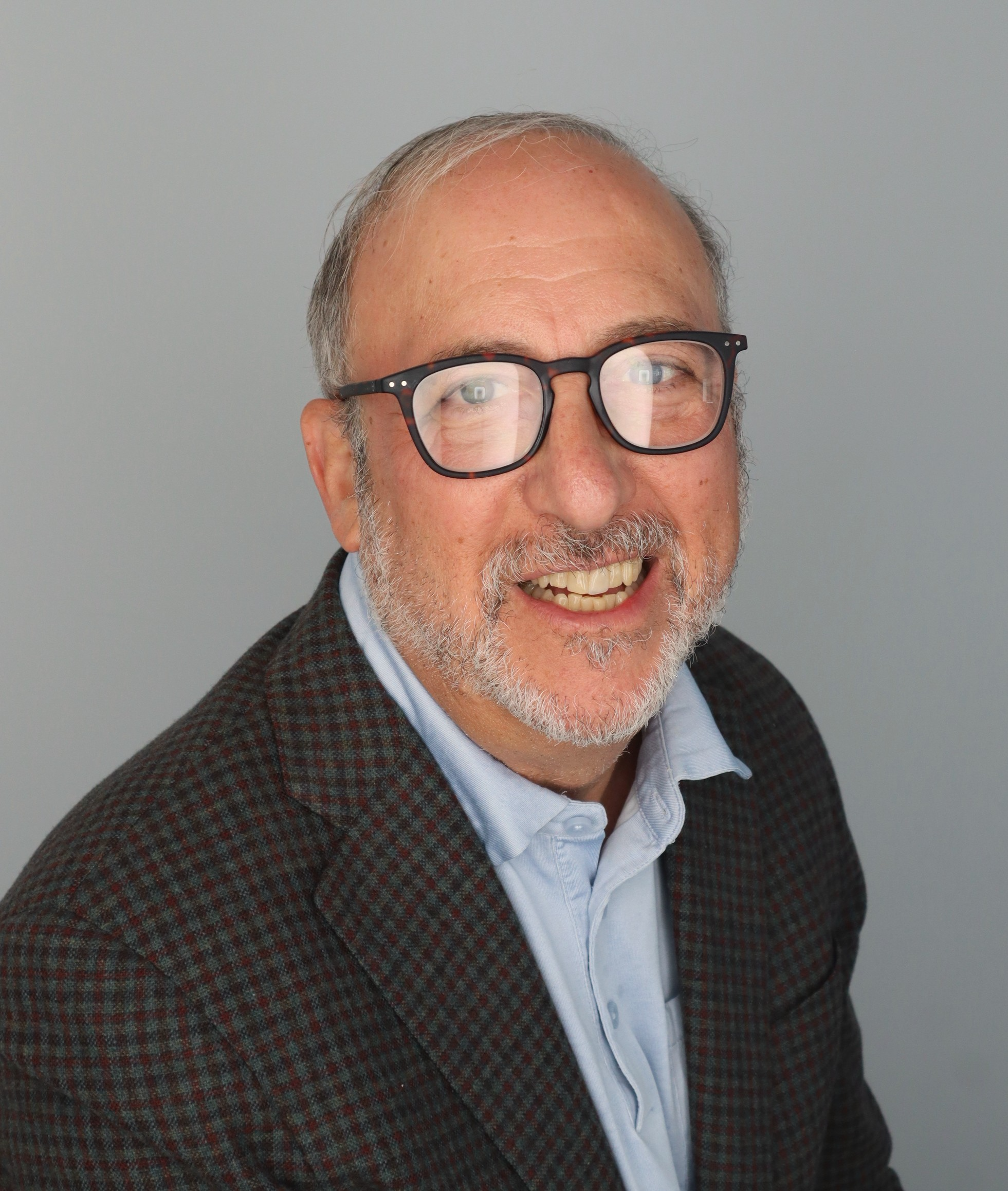
Organizers
Negotiations Webinar Series: “On the Use of AI in Frontline Negotiation: Current Trends and Outlook for the Future”
Join us on Wednesday, February 25, 2026 (10–11 a.m. ET) for the first session of our two-part Negotiations Webinar Series, hosted by the Harvard Humanitarian Initiative.
🎙 Webinar 1: “On the Use of AI in Frontline Negotiation: Current Trends and Outlook for the Future”
Featuring Claude Bruderlein, Esq., LL.M., Adjunct Lecturer and Senior Researcher, and Founder of Frontline Associates.
This session explores how emerging technologies are reshaping decision-making, risk management, and accountability at the negotiation table. Our faculty will discuss AI-enabled negotiation support and practical considerations for integrating AI responsibly into organizational practices.
🔗 Free and open to the public
📍 Join via Zoom: hsph.me/negotiations-webinar-feb-25
📲 Or scan the QR code in the event image
📅 Save the date for Webinar #2: “The Making of Negotiating Organizations” on March 25, 2026. Stay tuned for more details.
Please share with your networks and anyone who may be interested.
Questions? hhi@harvard.edu.

